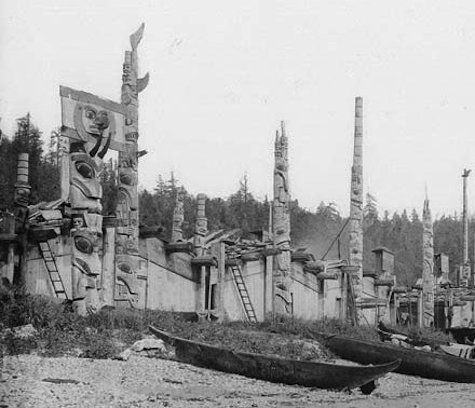Turning to indigenous peoples news relating to my hometown, Newton MA, this troubling story popped up on my radar last week…

July 1878: Skidegate Indian Village of the Haida tribe. Skidegate Inlet, British Columbia, Canada. (Library and Archives Canada)
Alaska Dispatch News – “Massachusetts college cancels sale of Alaska Native art”:
A Massachusetts theology college has abandoned plans to sell off art from 52 Native tribes, including Tlingit and Haida items, as the federal government investigates.
The Andover Newton Theological School could face penalties for quietly planning the sale of 80 Native art pieces this summer, possibly violating a federal law that would require some items to be returned to the tribes, reported KTOO-FM [Juneau AK].
The Peabody Essex Museum in Salem, Mass., has displayed the collection since the 1940s and alerted hundreds of tribal leaders to Andover Newton’s plans.
[…]
Andover Newton president Martin Copenhaver didn’t comment but forwarded KTOO-FM a letter that said the school “will proceed to repatriate artifacts if feasible and appropriate ways can be found to do so.”
The collection of Alaska Natives objects included many items of spiritual significance under traditional religions of the Alaska and Pacific Northwest coasts, which Christian missionaries seized in their efforts to force the Native populations of the Alaskan Panhandle and coastal British Columbia to convert (or just stay in line under White authority). One item was a decorated halibut hook, emblematic of the Native coastal fishing cultures.
The school now faces a formal investigation by the Federal government’s Interior Department, under the Native American Graves Protection and Repatriation Act of 1990 and could potentially face fines of close to $20,000 for violations from the attempted sale.
Massachusetts has long had complicated and destructive ties with Alaska Native communities because of the New Bedford-based global whaling industry, which often hunted whales industrially in Alaska’s Pacific and Arctic waters traditionally harvested (at a much lower impact) by Alaska Natives. Christian missionaries from the Bay State often followed their economic counterparts into other parts of the world.
While I wish Andover Newton had been more diligent and thoughtful, I’m glad the Peabody Essex Museum did its part to help stop this illegal sale and encourage the restoration of Alaska Native artifacts to the opposite coast, where they rightfully belong. The Museum has an excellent collection (well beyond these items) of Native American Art, past and present, from many different Native cultures of North America.
In 5th grade at Newton’s Angier School, after I had been lucky enough to be assigned the Haida peoples of the Pacific Northwest for a research project on Native heritage, I got to go on a field trip to the Peabody Essex Museum and see some distinctive Haida and Tlingit art in person — an experience that has stuck with me for all these years. The collection will remain strong and vibrant even after the Andover Newton items stolen from Alaska’s and British Columbia’s Tlingit and Haida people by missionaries are repatriated.
This is an important symbolic step in repairing the hurt and pain that some of our state’s citizens caused many years ago in that part of the world.


